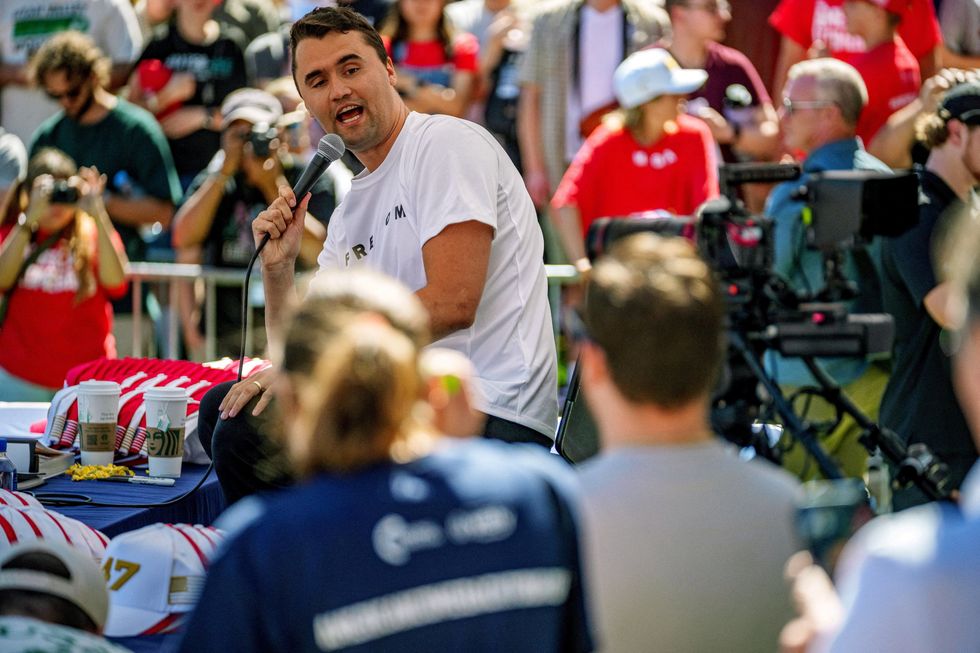'Chilling effect': College Charlie Kirk dropped out of faces demands to silence critics
Charlie Kirk never graduated college. He also wrote a book called The College Scam: How America's Universities are Bankrupting and Brainwashing Away the Future of America's Youth.
Nonetheless, after the right-wing activist was killed last month, shot dead aged 31, administrators at the Illinois community college where he enrolled for five semesters fielded calls to both honor Kirk and discipline an employee who criticized his views, records obtained by Raw Story show.
Kirk attended Harper College in Palatine, Illinois, a northwest Chicago suburb, from 2013 to 2014, before dropping out to co-found Turning Point USA, a national student group.
On Sept. 10, Kirk was killed while speaking at a Turning Point event at Utah Valley University in Orem, Utah.
 Right-wing activist and commentator Charlie Kirk Right-wing activist and commentator Charlie Kirk appears at a Utah Valley University speaking event in Orem, Utah, before he was fatally shot on Sept. 10. (Trent Nelson/The Salt Lake Tribune via REUTERS)
Right-wing activist and commentator Charlie Kirk Right-wing activist and commentator Charlie Kirk appears at a Utah Valley University speaking event in Orem, Utah, before he was fatally shot on Sept. 10. (Trent Nelson/The Salt Lake Tribune via REUTERS)
In the aftermath, as conservative activists incited a wave of firings of Kirk critics, Harper’s Board of Trustees received an email from “A very concerned Father,” threatening legal action if the school didn’t consider removing an instructor who posted criticism of Kirk.
Another emailer expressed concerns about a nursing student’s posts. The message landed in the inboxes of the school’s president, provost and vice president of diversity, equity and inclusion, records obtained through an Illinois Freedom of Information Act request show.
Eugene Volokh, a First Amendment scholar and senior fellow at the Hoover Institution at Stanford University, said such emails could hamper free expression.
People, he said, “may be worried about expressing their views on all sorts of topics … especially if it's a successful attempt to get someone fired or expelled or disciplined.”
Records from Harper also show an alumnus encouraging the school to establish a tribute or memorial to Kirk.
Other emails showed a professor attempting to recruit students to reactivate the school’s Turning Point chapter prior to Kirk’s death, as well as a request by a visitor to the Provost’s Office to “recruit 25 female students” for “a Charlie Kirk type of event,” which the school deflected.
“Harper students want to know that campus is a place where they can safely learn, engage with others and express themselves,” Bryan Wawzenek, a college spokesperson, told Raw Story.
“Our college remains committed to being a place where every individual is treated with dignity and where safety, belonging and civil discourse are paramount.
“In these difficult times, Harper will continue to center our mission and remain focused on fostering care, understanding and opportunity for all.”
‘Certainly not incitement’
On Sept. 15, Harper’s trustees received an email threatening legal action if the college did not investigate and “consider removing” Isaiah Carrington, a Leveraging Equity in Academia through Diversity (LEAD) Faculty Fellow and speech instructor.
A month later, Harper confirmed Carrington was still an employee but declined to comment further.
Carrington declined to comment.
In the email, a “very concerned Father” alleged Carrington posted “derogatory comments and harmful rhetoric that appear to justify violence, such as the assassination of Charlie Kirk, and persistently label[ed] individuals or groups who disagree with his views as Nazis, hate groups, or supporters of hate.”
The emailer’s name was redacted. Screenshots of Carrington’s posts were not included in the public records response.
Jeff Julian, Harper’s chief of staff and vice president of external affairs, suggested the chair of the board, Bill Kelley, reply to the email, saying the message would be forwarded to “college administration for awareness and consideration.”
A Raw Story review of Carrington’s public Facebook posts made clear he did not support Kirk’s murder but called into question Kirk’s past public comments, particularly about children watching public executions, and his history of racist remarks.
In one Sept. 11 post, Carrington shared a link to a Wired article about Kirk’s plans to discredit the Civil Rights Act.
“This is who Charlie Kirk is. I absolutely do not agree with a man being shot to death but I will not allow people to rewrite history,” Carrington wrote.
“Charlie Kirk actively fought against common sense gun laws, and literally said that passing the Civil Rights Act of 1964 was a mistake. If you are mourning the loss of him, then you have to acknowledge that you are also supporting his views. There is no such thing as separating the personal from the political.”
The “concerned father” alleged Carrington’s comments passed the test established in Brandenburg v. Ohio, ruling that inflammatory speech intending to incite illegal action can be restricted.
Volokh disagreed.
“Nothing in [the posts] is constitutionally unprotected,” he said.
“There are some exceptions to First Amendment protection, but none of them are in play here. This is certainly not incitement.”
‘Wrong message’
Another community member emailed Harper about posts criticizing Kirk, this time from a nursing student.
Derek Leiter, dean of Harper's Health Careers Division, encouraged professors to neither respond nor reach out to the student.
“The posts included multiple derogatory remarks, including labeling people who expressed grief over his passing as ‘stupid,’ along with other content that could be interpreted as promoting hate or intolerance,” the emailer wrote.
“As someone who may or may not share the same political beliefs, I found the posts troubling — especially considering that [redacted] provide compassionate, unbiased care to people of all backgrounds and belief systems.”
The emailer claimed the student’s posts “could reflect poorly on the [nursing] program.”
Volokh said it was “not a student's duty” to represent their program in social media posts.
“There can be no obligation, given the First Amendment, for students to refrain from constitutionally protected speech because it’s not inclusive enough,” he said.
While community members have First Amendment rights to report posts, pushes for people to be fired or disciplined for criticizing Kirk are “sad,” said Zach Greenberg, faculty legal defense and student association counsel at the Foundation for Individual Rights and Expression (FIRE).
“It absolutely has a chilling effect, and it sends the wrong message on college campuses, which are supposed to be areas where free speech is zenith, where you're the most free to discuss these issues,” Greenberg said.
‘Culturally diverse’
Harper’s President, Avis Proctor, emailed colleagues the day after Kirk’s death, acknowledging the anniversary of Sept. 11 terror attacks and “pain and uncertainty … from reports of increased immigration enforcement in the Chicago area, to the tragic shooting in Utah that claimed the life of Harper alumnus Charlie Kirk.”
“My heart is heavy for his wife and two young children. While perspectives may differ, violence must never be the response to disagreement,” Proctor wrote.
“As an institution of higher education, we strive to foster civil discourse and uphold the dignity of every person. We are strongest when we engage one another with humanity. I am deeply saddened by this senseless act of violence and remain steadfast in our commitment to a safe, inclusive and compassionate society.”
Proctor’s message, titled “Lifting Up Our Shared Humanity Amid Immigration Challenges and Political Violence,” prompted emails of appreciation from staff.
Ilknür Ozgür, a new faculty member in Communication Arts Department, responded to Proctor’s email about ways the department could “uplift the stories” of students who historically “haven't been very socially active,” she told Raw Story.
Ozgür said raids by U.S. Immigration and Customs Enforcement (ICE) have directly affected her students, one giving a recent speech about her uncle becoming “a viral sensation in the worst way possible” when he was wrongfully detained.
ICE took a student into custody at a nearby school, Elgin Community College, in September, making Ozgür “really proud” of her students for still coming to campus.
“It is such a powerful time to be able to hold a safe space for students to learn how to use their voice to create change,” she said.
Wawzenek said Harper students had “express[ed] concern regarding the manner in which immigration enforcement is currently being implemented in the Chicagoland area.”
“These circumstances are causing anxiety for members of the Harper community,” he added. “As such, Harper seeks to support our community with a variety of resources while communicating clearly about guidance for immigration enforcement at the college.”
Ozgür, who also runs a nonprofit, Artstillery, said she would mount a production of “Dirty Turk AKA. Dirty Immigrant” at Harper in March. The piece is based on her family's story of immigrating to Chicago and weaves in narratives from other refugee and migrant families, she said.
 Ilknür Ozgür, Harper College faculty (provided photo)
Ilknür Ozgür, Harper College faculty (provided photo)
As the Trump administration has pulled billions of dollars from universities, some small colleges have kept quiet, Raw Story reported. Ozgür commended Harper for embracing diversity when diversity, equity and inclusion programs are under attack.
Calling Harper “such a rich, culturally diverse campus,” Ozgür said: “With so many college campuses losing their funding based on what they're teaching and what they're doing, I'm so proud of Harper for … not being scared.”
‘A memorial or tribute’
Harper records also show Kirk’s death prompted calls to honor him and inspired interest in events similar to debates he took to campuses across the country.
“Regardless of political views, Charlie was a nationally recognized figure whose impact reached far beyond our campus,” read an email to administrators sent on the evening of Sept. 10.
“As a Harper alumnus, he represented the diversity of thought and the real-world engagement that our institution encourages. In light of his passing, I strongly believe that Harper College should consider establishing a memorial or tribute in his honor.
“Such a gesture would not only acknowledge his connection to our college but also show that Harper respects and remembers its alumni, particularly those who have had a significant impact on public life.”
Wawzenek said: “Harper does not have any plans for a memorial or tribute at this time.”
The school’s Turning Point USA chapter has been reactivated after meeting the required threshold of seven students, Wawzenek said.
Melanie Duchaj, student engagement coordinator, said Steve Gomez, a psychology professor, had been recruiting students to the group prior to Kirk’s death, according to a Sept. 12 email.
Gomez did not respond to a request for comment.
As for the man who visited the Provost's Office to request the school’s help with recruiting female students for a “Charlie Kirk type of event,” Provost Ruth Williams said a staff member “expertly” referred the person to the school’s “Free Speech tables and that if he wanted a room to hold an event he would have to rent it.”
“She also stated we would not recruit students for him,” Williams wrote.
Greenberg said it was important for colleges to remain neutral.
“Although many people may be offended by … Charlie Kirk commentary, it remains fully protected by the First Amendment,” Greenberg said.
“In order to have a more tolerant open society, we should be accepting of a wide array of political viewpoints, including commentary about public figures like Charlie Kirk.”


